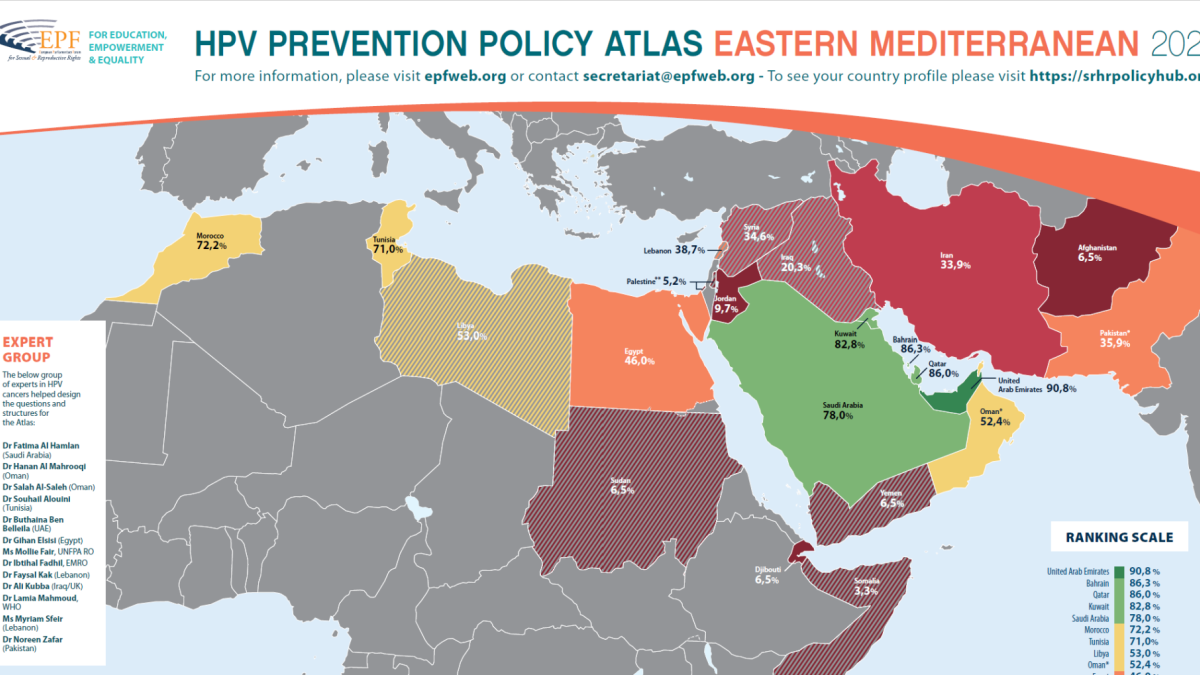
Riyadh, Saudi Arabia – 17 April 2025. The Global Alliance for Health, Rights and Development (GPA), an initiative of the European Parliamentary Forum on Sexual and Reproductive Rights (EPF), in partnership with the Saudi Ministry of Health, and Rofaida Women’s Health Organization, today launched the HPV Prevention Policy Atlas: Eastern Mediterranean Region (EMRO) Riyadh, with participants also joining online.
Despite medical advances, HPV remains a persistent global public health threat. Each year, an estimated 700,000 people worldwide are diagnosed with HPV-related cancers, with cervical cancer disproportionately affecting women in low-resource settings. In the WHO Eastern Mediterranean Region alone, about 89,800 women were diagnosed with cervical cancer in 2020, and more than 47,500 died from this largely preventable disease.
Developed in collaboration with a group of oncology and cervical cancer experts, the HPV Prevention Policy Atlas EMRO includes 21 sub-criteria to benchmark national progress and identify gaps in policy implementation. The HPV Atlas is not an epidemiological tool but a living document—a catalyst for political dialogue, civil society organisations advocacy, and policy change.
The HPV Atlas provides a comparative overview of 22 countries and territories in the Region, scoring their policies in three key areas:
- Primary prevention through HPV vaccination
- Secondary prevention through cervical cancer screening
- Public access to accurate online information on HPV and prevention
Saudi Arabia ranks among the top performers together with other Gulf states, with its excellent vaccination policies on HPV, free and available screening and excellent information provided by the state. Additionally, Saudi Arabia has recently extended eligibility for the HPV vaccine to women up to the age of 26, and in some cases 45, demonstrating strong alignment with WHO targets. On the other hand, countries such as Afghanistan and Somalia currently lack both HPV vaccination policies and reliable screening programs, highlighting the urgent need for international support and national political will.
This launch event, attended by government officials, UN agencies, WHO representatives, private sector leaders, and civil society advocates, built momentum for regional and global commitments in support of WHO’s global call to eliminate cervical cancer as a public health issue. This goal can be achieved through vaccination coverage of 90% or more, widespread screening and access to early treatment.
For any additional information, please contact:
Chiara Sammito, EPF Communications Officer
communications@epfweb.org | www.epfweb.org
About EPF
The European Parliamentary Forum on Sexual and Reproductive Rights (EPF) is a network of parliamentarians committed to advancing global health, gender equality, and human rights. Its Global Parliamentary Alliance for Health, Rights and Development (GPA), launched in 2019, brings together over 160 parliamentarians and numerous parliamentary working groups from across Europe and the Global South.
About Rofaida
Rofaida Women's Health Organization is a non-profit organization based in Riyadh, established in 2016 to promote women's health and well-being in Saudi Arabia. Our vision is to empower women with the knowledge, skills, and supportive policies that enable them to make informed health decisions. That is translated in our core strategy to INFORM [providing reliable information], EDUCATE [effective hands-on training], and ADVOCATE [strategic advocacy] to promote women's health.
About the Deputyship of Population Health
The Deputyship of Population Health at the Saudi Ministry of Health is committed to enhancing the overall health and quality of life for all people in the Kingdom. Established to lead a national shift toward preventive care, the deputyship focuses on understanding and addressing the broader determinants of health—social, economic, environmental, and behavioural.
Through innovative policies, integrated care models, and data-driven decision-making, the deputyship aims to build healthier communities and reduce the burden of disease across Saudi Arabia.